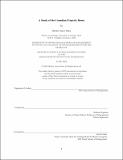| dc.contributor.advisor | Roberto Rigobon. | en_US |
| dc.contributor.author | Zhou, Shirley Xueer. | en_US |
| dc.contributor.other | Sloan School of Management. | en_US |
| dc.date.accessioned | 2020-09-03T17:41:15Z | |
| dc.date.available | 2020-09-03T17:41:15Z | |
| dc.date.copyright | 2020 | en_US |
| dc.date.issued | 2020 | en_US |
| dc.identifier.uri | https://hdl.handle.net/1721.1/127000 | |
| dc.description | Thesis: S.M. in Management Studies, Massachusetts Institute of Technology, Sloan School of Management, May, 2020 | en_US |
| dc.description | Cataloged from the official PDF of thesis. | en_US |
| dc.description | Includes bibliographical references (pages 30-33). | en_US |
| dc.description.abstract | Canadian real estate has experienced unprecedented rapid growth since the early 2000s. People are buying homes out of concern and hope that prices may continue to rise. The immediate consequence of this trend is the changes in affordability for Canadian households. Increasing number of individuals have had to shoulder debt burdens that exceed their capacity to pay as a result of the price inflation. This has generated significant risk for the financial system and the strength of the economy. The vulnerabilities due to the housing market performance may undermine economic fundamentals and weaken the economy's ability to withstand disruptions. In this paper, the present economic conditions are examined to understand the general health of the Canadian economy. A comparison between the housing market boom in Canada and the exuberance of the 2006 US housing is drawn to gauge the degree to which the former market performance is heated. In addition, an analysis of the key variables that has fed into the growth in home prices will be presented to address how these elements contributed to the price appreciation. The optimism around Canada's housing market is worrying and the impact could be debilitating to the country's economic well-being. In light of the novel Covid-19 pandemic and its effects on the economy, where home prices will go is ever-more relevant. The paper will discuss the vulnerabilities that undermine Canada's economic resilience and conclude that the present stability is unsustainable. | en_US |
| dc.description.statementofresponsibility | by Shirley Xueer Zhou. | en_US |
| dc.format.extent | 33 pages | en_US |
| dc.language.iso | eng | en_US |
| dc.publisher | Massachusetts Institute of Technology | en_US |
| dc.rights | MIT theses may be protected by copyright. Please reuse MIT thesis content according to the MIT Libraries Permissions Policy, which is available through the URL provided. | en_US |
| dc.rights.uri | http://dspace.mit.edu/handle/1721.1/7582 | en_US |
| dc.subject | Sloan School of Management. | en_US |
| dc.title | A study of the Canadian property boom | en_US |
| dc.type | Thesis | en_US |
| dc.description.degree | S.M. in Management Studies | en_US |
| dc.contributor.department | Sloan School of Management | en_US |
| dc.identifier.oclc | 1191228521 | en_US |
| dc.description.collection | S.M.inManagementStudies Massachusetts Institute of Technology, Sloan School of Management | en_US |
| dspace.imported | 2020-09-03T17:41:15Z | en_US |
| mit.thesis.degree | Master | en_US |
| mit.thesis.department | Sloan | en_US |
